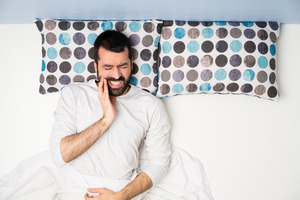Why Does Your Jaw Hurt in the Morning? 3 Possible Reasons
August 9, 2024

Lately, you’ve noticed that your jaw feels sore whenever you wake up in the morning. What exactly is the cause of this problem? The answer can vary from case to case, and you will likely need a professional’s help to get a definitive answer. That being said, below you’ll find 3 possible causes of jaw pain along with a brief look at potential solutions such as TMJ treatment.
1. Bruxism
When you’re asleep, you may end up unconsciously grinding or clenching your teeth. This is called bruxism, and it can lead to inflammation in the joints keeping your lower jaw connected to your skull. On top of that, the constant pressure on your teeth can significantly wear down your enamel and put you at risk for dental damage.
If your dentist identifies signs of bruxism, they can help you find relief with a simple oral appliance called a nightguard. This device is similar to the mouthguards that are typically used while playing sports, but it’s meant to be worn when you go to bed. The nightguard will keep your upper and lower teeth separated, thus reducing the effects of bruxism and protecting you from jaw pain and other issues.
2. Temporomandibular Joint Disorder
The temporomandibular joints (also known as the TMJs for short) are what allow you to make the jaw movements necessary for biting, chewing food, and speaking. However, if the TMJs don’t function the way they should, the result can be a TMJ disorder. Not only can this condition lead to jaw pain, but it can also make it more difficult to open your mouth.
There are several possible causes of TMJ disorder, but in many circumstances, your dentist can treat it with a personalized oral appliance. Said appliance will help your jaw find a better resting position so that your TMJs aren’t exposed to as much pressure.
3. Sleep Apnea
Having sleep apnea means that your breathing is repeatedly being interrupted while you slumber, likely as a result of the airway being blocked by relaxed soft tissues in your mouth or throat. In an effort to clear the airway, your body may push the lower jaw forward, leading to tension in the jaw joints that can ultimately result in discomfort.
You’ll need to undergo a sleep test in order to have your sleep apnea diagnosed, at which point you will be able to pursue treatment. While CPAP is considered the gold standard when it comes to addressing sleep apnea, sometimes your dentist may be able to offer oral appliance therapy as an alternative. A well-made oral appliance can help you maintain a clear airway in order to prevent breathing interruptions.
About the Practice
Here at Wayland Dental, we welcome patients of all ages and strive to bring them the personalized care that they deserve. In addition to preventive and restorative dental services, we also offer mouthguards for bruxism as well as oral appliances for TMJ disorder and sleep apnea. If you would like to schedule a consultation with us, visit our website or call (508) 651-0500.
